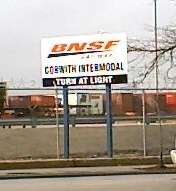Brighton Park, Chicago
| Brighton Park | |
|---|---|
| Community area | |
| Community Area 58 - Brighton Park | |
 Location within the city of Chicago | |
| Coordinates: 41°49.2′N 87°42.0′W / 41.8200°N 87.7000°WCoordinates: 41°49.2′N 87°42.0′W / 41.8200°N 87.7000°W | |
| Country | United States |
| State | Illinois |
| County | Cook |
| City | Chicago |
| Neighborhoods |
list
|
| Area | |
| • Total | 2.72 sq mi (7.04 km2) |
| Population (2010) | |
| • Total | 45,368 |
| • Density | 17,000/sq mi (6,400/km2) |
| Demographics2010[1] | |
| • White | 8.12% |
| • Black | 1.19% |
| • Hispanic | 85.29% |
| • Asian | 4.96% |
| • Other | 0.44% |
| Time zone | CST (UTC-6) |
| • Summer (DST) | CDT (UTC-5) |
| ZIP Codes | parts of 60632 |
| Median income | $36,245 |
| Source: U.S. Census, Record Information Services | |
Brighton Park is a neighborhood located on the southwest side of Chicago, Illinois. It is number 58 of the 77 community areas of Chicago.
Brighton Park is bordered on the north by the former Illinois & Michigan Canal and the current Chicago Sanitary and Ship Canal, on the east by Western Avenue, on the south by 49th Street, and on the west by Central Park Ave. [2]
The neighborhood is a mix of residential areas, commercial zones, industrial works and transportation (primarily railroad and trucking) facilities. It is relatively peaceful, according to Chicago Police Department statistics (2004 CPD Annual Report).
History
| Historical population | |||
|---|---|---|---|
| Census | Pop. | %± | |
| 1930 | 46,552 | — | |
| 1940 | 45,030 | −3.3% | |
| 1950 | 41,345 | −8.2% | |
| 1960 | 38,019 | −8.0% | |
| 1970 | 35,671 | −6.2% | |
| 1980 | 30,770 | −13.7% | |
| 1990 | 32,207 | 4.7% | |
| 2000 | 44,912 | 39.4% | |
| 2010 | 45,368 | 1.0% | |
Brighton Park took its name from the Brighton neighborhood of Boston, Massachusetts, which was famed for its cattle market. Brighton Park was incorporated as a village in 1851 and annexed into the city of Chicago in 1889[3] (some earlier maps show the north section of the neighborhood as part of Cicero, Illinois[4]). It was formed originally near the intersection of the Blue Island Plank Road, now Western Avenue, and the old portage trail between the Chicago River and the Des Plaines River, a trail that eventually evolved into Archer Road, now Archer Avenue, which is now the main thoroughfare through Brighton Park. In 1855, Chicago mayor "Long" John Wentworth built the Brighton Park horse racetrack (whose name conveniently alluded to the more famous Brighton Racecourse in England) directly east of the village, in what is now the Chicago Park District's McKinley Park.
By 1871, the year of the Great Chicago Fire, Brighton Park was served by the Archer Avenue horsecar and the Alton Railroad. (Brighton Park was not affected by the fire). The railroad built a roundhouse in the neighborhood, and various factories were built.[5] Later the streetcar was electrified and extended and interurban electric railway service was provided by the Chicago and Joliet Electric Railway[6] until 1934. Most of the residential buildings now in Brighton Park were built in the early part of the 20th century, between 1905 and 1925, after more electric streetcar lines (on Western Ave, Kedzie Ave, 35th St and 47th St) had been extended into the neighborhood,[7] providing cheap & quick transport to work.
By the turn of the century, Brighton Park was becoming a destination for many European immigrants, particularly those arriving from Italy, Poland and Lithuania.[5] The neighborhood's Polish identity was evidenced along Archer Avenue, which became the neighborhood's main street for Polish owned businesses.[8]
Transportation

Chicago's role as transportation gateway has always been a major influence on the demographics and economy of Brighton Park. Two major railroad landmarks exist in Brighton Park. The Corwith Intermodal freight facility, once known as Corwith Yards, covering nearly a square mile, is one of the major industrial features of Brighton Park. Brighton Park crossing, near Western Avenue and Archer Avenue, is a major Chicago railroad junction and the former site of Brighton Park's railway station.
Access to, property values, and economic growth in the neighborhood have been improved by the 1964 opening of the Stevenson Expressway, Interstate 55, the 1993 opening of the Orange Line rapid transit line, and the revitalization of the nearby Midway International Airport.
Government and infrastructure
The United States Postal Service operates the Elsdon Post Office at 3124 West 47th Street. Post Office is closed as of June 2010.[9]
Education
Chicago Public Schools operates district public schools.
The United Neighborhood Organization operates the Sandra Cisneros School and the Officer Donald J. Marquez School in Brighton Park.[10]
References
- ↑ Paral, Rob. "Chicago Demographics Data". Archived from the original on 2 June 2013. Retrieved 21 September 2012.
- ↑ http://www.cityofchicago.org/content/dam/city/depts/doit/general/GIS/Chicago_Maps/Community_Areas/CA_BRIGHTON_PARK.pdf
- ↑ http://www.chicagoparkdistrict.com/index.cfm/fuseaction/parks.detail/object_id/092782AD-C130-402D-B39F-1108E6F382BC.cfm[]
- ↑ "Map of Chicago and Environs, 1888". Chicago Historical Society and The Newberry Library. 2005. Retrieved 2014-04-29.
- 1 2 "Brighton Park". Chicago Historical Society and The Newberry Library. 2005. Retrieved 2014-04-29.
- ↑ http://www.chicagorailfan.com/maptcjer.html
- ↑ http://www.chicagorailfan.com/mapt1914.html
- ↑ "Poles". Chicago Historical Society and The Newberry Library. 2005. Retrieved 2014-04-29.
- ↑ "Post Office Location - ELSDON". United States Postal Service. Retrieved April 17, 2009.
- ↑ "UNO Charter Schools Archived April 30, 2012, at the Wayback Machine.." United Neighborhood Organization. Retrieved on June 16, 2012.
External links
 |
South Lawndale, Chicago | |
Lower West Side, Chicago |  |
| Archer Heights, Chicago | |
McKinley Park, Chicago | ||
| ||||
| | ||||
| West Elsdon, Chicago | Gage Park, Chicago | New City, Chicago |